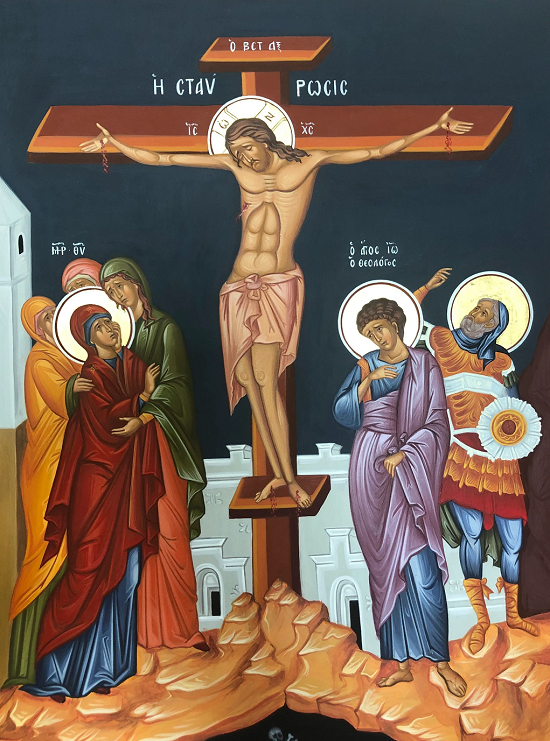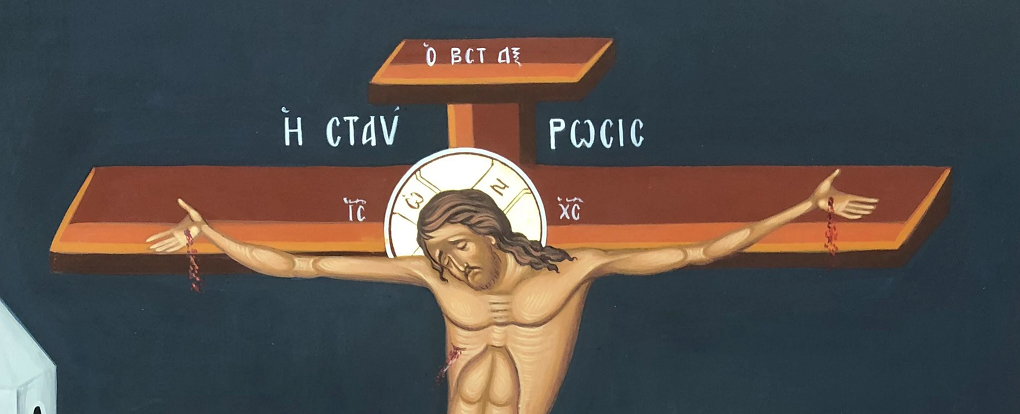The Background Story
Good Friday Scripture Readings

By this time, all of us must be intimately familiar with the details of Jesus’s crucifixion: the nails in his hands and feet, the charge against him affixed to his cross, the wine-soaked sponge, his agony and outcry, his taking his last breath, and the lance in his side. Yet, if that were the only important focus of John’s narrative, why the lengthy details, especially his interrogation before the High Priests and Pilate? Is there a significance to the background details of the drama that isn’t immediately obvious? After all, this is the mystical gospel, and the entirety of John’s telling of the story of Jesus is meant to be taken as a lesson for us his readers, isn’t it? By the time this gospel was written, decades had already passed since the events it describes. It was a different audience than when there were eyewitnesses. How can we get in touch with the meaning that John meant to convey to the people of his time?
The passion narrative is, first and foremost, a drama. Like all dramas, it’s made up of the interactions of a cast of characters, each of which has a specific agenda. Let’s talk about them. Always at center stage is Jesus. Evidently, he has a clear idea of his mission: to bring the reign of God, his heavenly Father, to birth in the world through his humble and faithful obedience to God’s will. He doesn’t specifically seek out martyrdom, but he is willing to undergo any trials—however severe—to accomplish his mission. He finds himself surrounded by ignorance, misunderstanding, false hopes, misplaced fears, and misdirected hatred.
Then, there are Jesus’s disciples. These men are both confused and frightened. They’ve recently returned openly to Jerusalem despite the threats against Jesus’s life…and theirs. This wasn’t what they’d bargained for when they left everything to follow this rabbi. Now, they’re hearing rumors of betrayal and death. This isn’t the kingdom they’d been expecting. It seemed to all be going wrong. Was it heading in the same direction as so many other liberation movements before them that had come to a bad end?
Among the disciples were John, Peter, and Judas. John was almost too young to be afraid and, besides, he had friends among the High Priest’s staff. Peter was upset that Jesus was doubting his loyalty and courage. He was so committed to Jesus that he couldn’t imagine a situation where his love would be tested beyond the breaking point. After all, weren’t he and John taken aside time and time again to share a special intimacy with Jesus, even to having seen him transfigured? Then there was Judas, the CFO of the group. He wasn’t by nature a thief, but maybe he’d gone a little overboard with his purchases, especially when the treasury was brimming with cash. Yet, Jesus’s open confrontations with the Jewish authorities concerned him. That was putting the whole venture at risk. The authorities only wanted to question Jesus away from the crowds, so what would be the harm of telling them where to find him at night, hiding out in the garden on the Mount of Olives? Besides Jesus had held his own under tough questioning many times before. What would another interrogation by the Jewish authorities hurt?
So, who were these Jewish authorities who were at their wits end with this Galilean preacher? The ringleader was old man Annas, the godfather of the high priestly clan. Not only had he been high priest himself, but he’d also secured the position for all five of his sons, his grandson, and now his son-in-law, Caiaphas, the current High Priest. In his tenure, he’d been able to broker a sweet deal with the Roman occupation authorities. He’d keep a lid on popular dissent, and the Romans would ensure that his family remained in power. Sure, Herod Antipas was the tetrarch of the region, but it was the High Priestly clan and their cronies that kept things under control in Jerusalem.
The Romans considered the Jewish population to be a troublesome bunch and they were happy to have allies among their leadership. Keeping Annas and his crew in power was a small price to pay for keeping the peace and keeping Emperor Tiberias off their backs. All the Romans wanted was law and order and a peaceful flow of cash, goods, and services. The arrangement worked for everybody…but Pilate. Pilate hated everything about his assignment. He was happiest when he was home in his palace in Caesarea, far away from Jerusalem, but every year he had to come down there and stay in the Praetorium to make sure there wasn’t any trouble. At Passover time, Jews from all over the empire poured into Jerusalem. If there was going to be an uprising, it’d be at this season. It had happened before and, even now, there were at least three seditionists in prison: one named Barabbas, and two others who were awaiting execution. Hanging them on crosses along the roadway just before the start of the festival might just put a damper on any revolutionary plots that might have been hatching.
So, what happened? Annas and company knew the Romans’ temperament and were terrified there might be trouble. That would, of course, threaten their position. That preacher from Nazareth and his crew were drawing ever-larger crowds, and despite their warnings, they’d recently come marching back into town in front of God and everybody. Besides, Jesus had the nasty habit of criticizing them publicly, ridiculing them, and turning the ignorant masses against them. He’d embarrassed them and their staff once too often. It was now getting personal. They couldn’t take him into custody in broad daylight in front of the crowds. A disturbance was the last thing they wanted to risk. So, they’d offered a reward of thirty pieces of silver for information leading to the arrest and conviction of Jesus. That got Judas’s attention.
Once Jesus’s whereabouts had been given to them, they had to plan their next move carefully. Since it was all about keeping the Romans happy, they cleared everything with them. They didn’t want the Romans to get the wrong idea that perhaps they were the ones planning an insurrection, so they invited some of the Roman troops—as observers, of course—to accompany their own temple guards who were going to do the dirty work of taking Jesus into custody. It was a local police action. They arrested Jesus and took him to Annas’s house because they couldn’t convene their inquisition until the morning. Only then was Jesus given a hearing, first before Annas, then before the High Priest himself, Caiaphas. Although John doesn’t report it in his gospel, it was Caiaphas who asked the deadly question: “I order you to tell us under oath before the living God whether you are the Christ the Son of God.” Remember that Christ means “anointed king.” Jesus responded to the question with an evasive answer. Nevertheless, it was enough to give the leadership what they were looking for. It was beautiful. They had evidence of sedition that they could now bring to Pilate and get Jesus out of their hair for good. Judas never saw that coming, but Jesus did.
They then turned Jesus over to Pilate, accusing him of a crime against Rome. Pilate saw through their game. It took only a little questioning for Pilate to see that Jesus was only interested in spiritual matters and was no threat to the peace. He resented that the High Priests were trying to use him to get back at Jesus for embarrassing them publicly. He tried everything he could think of to foil their plans. Since Jesus was accused of sedition, he threatened to release to them Barabbas, a real seditionist. They called his bluff. Pilate was furious because the Jewish leaders were playing a more skillful political game than he, and they played their trump card. They had the power to cause a disturbance and report him to Rome as incompetent. That would be the end of his career. He had to capitulate to their demands, but he had the last laugh. The charges he had stapled to the cross read, “Jesus of Nazareth, the king of the Jews.”
When John speaks about “the Jews” with obvious contempt, he’s not referring to the Jewish people. Most of them in fact were oblivious to these goings-on. He meant their political and religious leadership. These people used their religion to further their own ends at the expense of the innocent and in direct opposition to the will of God. The reign of God proclaimed by the Messiah was one of justice, love, and peace. The corrupt leadership of the time used the words of religion, the words of Scripture even, to subvert the will of God. By climbing into bed with the politicians of the time and joining them in their game of thrones, the religious authorities destroyed themselves and the movement they sought to preserve. Sound familiar?
The churches today have a choice. They can continue to play political games to further their own ends and bring themselves and their institutions to a tragic end, or they can choose to bring the reign of God to life by aligning themselves with the anawim—God’s little ones—the poor, the marginalized, the misunderstood, the despised, the forgotten. What the Jewish leaders learned (the hard way) but our own so-called “Christian nationalists” have yet to learn is that playing political power games, especially in the name of God, puts people in opposition to God. God doesn’t play political power games. Political power games crucified him. When the smoke from the battles for political power and influence has cleared, God is always found in the collateral damage.
Get articles from H. Les Brown delivered to your email inbox.
